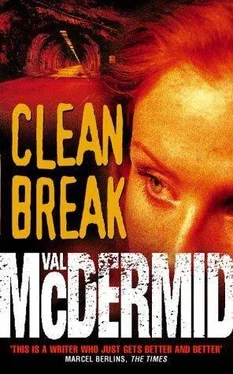Whatever Gianni’s boss was, he wasn’t short of a bob. The public rooms on the ground floor were all marble floored, with expensive Oriental rugs scattered around. The furniture was expensive repro, all polished to a mirror finish. There was nothing in the dining room, drawing room, morning room or the TV lounge to indicate that this was anything other than the home of a successful businessman. Even the videos lined up in the cabinet by the oversized TV were completely innocuous.
Cautiously, I made my way up the stairs. It was always possible that Turner was a prisoner somewhere inside the villa rather than the victim of my worst imaginings. Six doors opened off the long landing. The first two were lavish guest bedrooms, complete with en suite bathrooms. If Gianni’s boss ever set up in competition with Casa Nico, the pensione down the valley would go out of business within hours. The third door opened on what was clearly the master bedroom. The wardrobes were filled with designer suits and shirts, the drawers with silk underwear and the kind of leisure wear that has the labels on the outside. No trace of a woman in residence. No trace of any papers, either.
The fourth door opened on to a library. It was obviously a reader’s library rather than one where the books had been bought by the yard. Modern hardbacks lined the shelves. I noticed a sizeable chunk of crime fiction, but most of the books were by authors I’d never heard of. There was also a whole section of legal textbooks, mostly covering commercial and international law. But again, there were no papers anywhere, unless some of the books were dummies. If they were, they’d be hanging on to their secrets. There was no way I had time to go through that lot book by book.
The fifth door was locked. I left it for a moment and tried the sixth. Another guest bedroom. That told me that either Turner was behind the locked door, or something significant was. Unfortunately, I didn’t have my set of picklocks with me. I don’t carry them routinely, and when I’d set off on my pursuit of Turner, I hadn’t expected to be doing any burglaries. I could of course simply smash the lock with one of the dozens of marble statuettes that hung around in niches all over the place. But I didn’t want the villa’s owner to know the extent to which he’d been turned over unless I could possibly help it.
I looked up at the door lintel. Gianni’s boss was not much bigger than me, so the chances were that the key wasn’t sitting up there. I went back to the master bedroom and began a proper search. I got lucky in the bathroom. I’d taken the contents of the bathroom cupboard off the shelves one by one, just to make sure there was nothing behind them. There were two aerosol cans of Polo shaving foam, and one was a lot lighter than the other. I looked more closely at the heavier of the two. Gripping it tightly, I twisted the bottom of the can. It unscrewed smoothly, revealing a compartment lined with bubble wrap. Inside was what looked like a handkerchief. I pulled it out and a bunch of keys tumbled to the floor. “Gotcha!” I murmured.
The longest of the keys opened the locked door. Bingo! Inside was a starkly functional office, a sharp contrast to the luxurious appointments of the rest of the villa. I switched the light on, closed the shutters and took a good look round. A basic desk stood against one wall with a computer, a modem and a fax machine on it. To one side there was a photocopier and a laser printer. Automatically, I switched them on. I noticed a shredder under the desk as I sat down and hit the computer’s power button. The machine booted up and I called up the directories. Ten minutes later, my jubilation had given way to depression. Every single data file I’d tried to access was password protected. I couldn’t get in to read them. All it would let me do was print out a list of all files, which I duly did.
Muttering dark imprecations, I returned to the main directory. Time for some lateral thinking. In the years since I first started working at Mortensen and Brannigan and discovered the wonderful world of electronic mail, the Internet had grown from the home of academics and a handful of computer loonies like me to the world’s bulletin board. The communications software that was running on this machine was a standard business package that I’d used dozens of times before. Even if the files were password protected, I reckoned that the communications program would still be able to transmit them intact to somewhere I could retrieve them later and pass them on to someone who could crack the passwording. All I needed was a local number for the Internet. If I was lucky, there would be one already loaded in the comms program. I started it running and called up the telephone directory screen.
It was my lucky night. Right at the top of the list was the number for the local Internet node-the E-mail equivalent of a postal sorting office. The way the Net works is simple. It’s analogous to sending a letter rather than making a phone call. The network is connected by phone lines, and works on what they call a parcel switching system. What happens is you dial a local number and send your data to it. The computer there reads the address and shunts your data down the network, section by section, till it arrives at its destination. But unlike a letter, which takes days if you’re lucky, this takes less time than it takes to describe the process.
I used the edit mode to discover Gianni’s boss’s login and password, then I instructed the computer to connect me to the Internet. Less than a minute later, we were in. I typed in the electronic mail address of the office, then I started sending the files one by one. An hour and a mug of coffee later, I’d sent a copy of every data file in the machine back to Manchester.
Breathing a deep sigh of relief, I switched off the machine. Now it was time for the desk drawers. I unlocked each drawer with the remaining keys on the bunch. The first drawer held stationery. The second held junk-rubber bands, spare computer disks, a couple of computer cables, a half-eaten chocolate bar and a box of Post-it notes. The bottom drawer looked more promising, with its collection of suspension files. No such luck. All the files held was the paperwork for the house: utility bills, receipts for furniture, building work, landscaping, pool maintenance. The only interesting thing was that everything was in the name of a company-Gruppo Leopardi. There was no clue as to who was behind Gruppo Leopardi. And I didn’t have the time for the kind of thorough search that might reveal that. I’d already been there too long, and I was getting too tired to concentrate. It was time to make tracks.
I went back over to the window, to open the shutters again. I wanted to leave everything exactly as I’d found it. As I turned back, clumsy with exhaustion, I caught the Thermos jug with my elbow. It sailed off the desk and bounced off the paneled wall under the window. It landed on its side on the floor, apparently undamaged. Not so the wall. The wood paneling where the jug had hit had slowly swung away from the wall, revealing a safe. Eat your heart out, Enid Blyton. If preposterous coincidence is good enough for the Secret Seven, it’s good enough for me.
if the brannigans were posh enough to have a family motto, it would go something like, “What do you mean, I can’t*!” Just because I’ve never learned how to crack a safe didn’t mean I was going to close the panel and walk away. I sat on the floor opposite the safe and studied it. There was a six-digit electronic display above a keypad with the letters of the alphabet and the numbers zero to nine. Beside the keypad were buttons that I translated as “enter code,” “open,” “random reset,” “master.” That didn’t take me a whole lot further forward.
Читать дальше
Конец ознакомительного отрывка
Купить книгу












